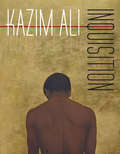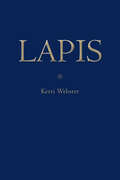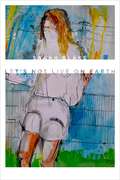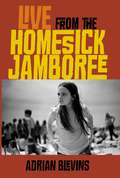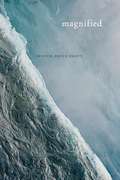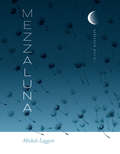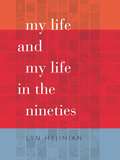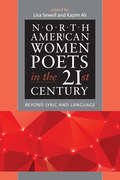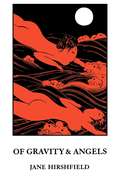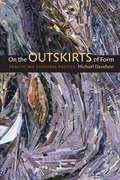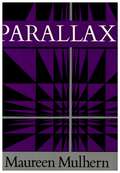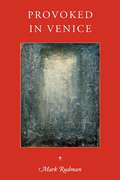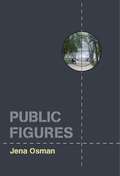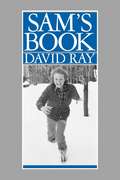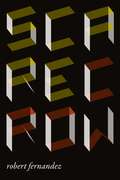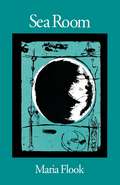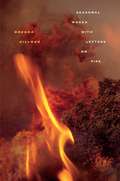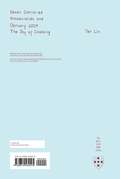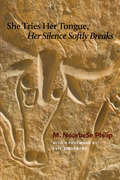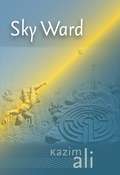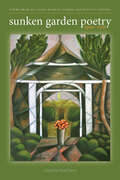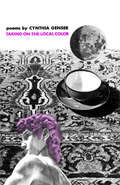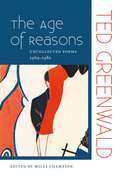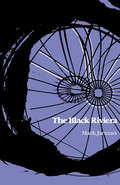- Table View
- List View
Inquisition (Wesleyan Poetry Series)
by Kazim AliDuring the 1982 air strikes on Beirut, Faiz Ahmed Faiz asked his friend Mahmoud Darwish “Why aren’t the poets writing this war on the walls of the city?” Darwish responded, “Can’t you see the walls falling down?” Queer, Muslim, American, Kazim Ali has always navigated complex intersections and interstices on order to make a life. In this scintillating mixture of lyrics, narrative, fragments, prose poem, and spoken word, he answers longstanding questions about the role of the poet or artist in times of political or social upheaval, although he answers under duress. An inquisition is dangerous, after all, especially to Muslims whose poetry and art and spiritual life has always depended not on the Western ideal of a known God or definitive text but on the concepts of abstraction, geometry, vertigo. “Someone always asks ‘where are you from,’” Ali writes, “and I want to say ‘a body is a body of matter flung/from the far corners of the universe and I am a patriot/of breath of sin of the endless clamor/out the window.’” Ali engages history, politics, and the dangerous regions of the uncharted heart in this visceral new collection.
Lapis (Wesleyan Poetry Series)
by Kerri WebsterIn Lapis, poet Kerri Webster writes into the vast space left by the deaths of three women: her mother, a mentor, and a friend. Using a wide array of lyric forms and meditations, Webster explores matrilineages both familial and poetic, weaving together death, spirituality, women, and a sense of the shifting earth into one "doctrine of Non-linear Revelation." Elegy And I was equal to my longing:the mums blackening; sorrow a carboned figurine; the firmament steaming; your ashesinterred in the boulder;the ugly birds crying dolor dolor dolor;the sky smoke-choked—what, then, would you have had be my register?As the beasts of the field rub their antlers off with ooh-itch pleasure; as the screen says You often open around this time; as the grapesblight: listen: sometimes we're the pilgrim, sometimes we're the site.
Let’s Not Live on Earth
by Sarah BlakeSarah Blake follows up her previous book of poetry, Mr. West, with a stunning second collection about anxieties and injury. Blake uses self-consciousness as a tool for transformation, looking so closely at herself that she moves right through the looking glass and into the larger world. Fear becomes palpable through the classification of monsters and through violences made real. When the poems find themselves in the domestic realm, something is always under threat. The body is never safe, nor are the ghosts of the dead. But these poems are not about cowering. By detailing the dangers we face as humans, as Americans, and especially as women, these poems suggest we might find a way through them. The final section of the book is a feminist, science fiction epic poem, “The Starship,” which explores the interplay of perception and experience as it follows the story of a woman who must constantly ask herself what she wants as her world shifts around her.
Live from the Homesick Jamboree (Wesleyan Poetry Series)
by Adrian BlevinsLive from the Homesick Jamboree is a brave, brash, funny, and tragic hue and cry on growing up female during the 1970s, "when everything was always so awash" that the speaker finds herself adrift among adults who act like children. The book moves from adolescence through a dry-eyed, poignant exploration of two marriages, motherhood, and the larger world, with the headlong perceptiveness and brio characteristic of Adrian Blevins's work. This poetry is plainspoken and streetwise, brutal and beautiful, provocative and self-incriminating, with much musicality and a corrosive bravura, brilliantly complicated by bursts of vernacular language and flashes of compassion. Whether listening to Emmylou Harris while thinking she should be memorizing Tolstoy, reflecting on her "full-to-bursting motherliness," aging body, the tensions and lurchings of a relationship, or "the cockamamie lovingness" of it all, the language flies fast and furious. As the poet Tony Hoagland wrote of Blevins's previous book, The Brass Girl Brouhaha, "this is the dirty, trash-talking, highly edified real thang."
Magnified (Wesleyan Poetry Series)
by Minnie Bruce PrattThis collection of love poems draws us into the sacred liminal space that surrounds death. With her beloved gravely ill, poet and activist Minnie Bruce Pratt turns to daily walks and writing to find a way to go on in a world where injustice brings so much loss and death. Each poem is a pocket lens "to swivel out and magnify" the beauty in "the little glints, insignificant" that catch her eye: "The first flowers, smaller than this s." She also chronicles the quiet rooms of "pain and the body's memory," bringing the reader carefully into moments that will be familiar to anyone who has suffered similar loss. Even as she asks, "What's the use of poetry? Not one word comes back to talk me out of pain," the book delivers a vision of love that is boldly political and laced with a tumultuous hope that promises: "Revolution is bigger than both of us, revolution is a science that infers the future presence of us." This lucid poetry is a testimony to the radical act of being present and offers this balm: that the generative power of love continues after death.Oh Death Someone sang, Oh death! Oh death! Won't youpass me over for another day? Someone said, I dreamed of you last night. I dreamed youwere telling me your whole life story. Whole. Whorled. Welkin, winkle, wrinkle.The loop of time holds us all together. The pile of laundry on the bed. Youfolding socks one inside the other. Wehave had this day, and now this night. The clothes are put away, and from the bed we seethe moon folding light into darkness, not death.
Mezzaluna: Selected Poems (Wesleyan Poetry Series)
by Michele LeggottMezzaluna gathers work from Michele Leggott's nine books of poetry. As reviewer David Eggleton writes: "Leggott shows us that the ordinary is full of marvels which... stitched, flow together into sequences and episodes that in turn form an ongoing serial, or bricolage: a single poem, then, rejecting exactness, literalism, naturalism in favor of resonance, currents, patterns of ebb and flow." In complex lyrics, sampling thought and song, voice and vision, Leggott creates lush textured soundscapes. Her poetry covers a wide range of topics rich in details of her New Zealand life, full of history and family, lights and mirrors, the real and the surreal. She focuses on appearance and disappearance as modes of memory, familial until we lose sight of that horizon line and must settle instead for a series of intersecting arcs. Leggott writes with tenderness and courage about the paradoxes of losing her sight and remaking the world in words.on white you fallinto lineher voice fillsthe groundpotato cuts the sundries paints the deck printsshapes shadows of oranges green 'cyan and magenta' sail your picnicsea into the eye land crimson lemons hand methe moonrisen rode rose ridewhite out to see
My Life and My Life in the Nineties (Wesleyan Poetry Series)
by Lyn HejinianLyn Hejinian is among the most prominent of contemporary American poets. Her poem My Life has garnered accolades and fans inside and outside academia. First published in 1980, and revised in 1987 and 2002, My Life is now firmly established in the postmodern canon. This Wesleyan edition includes the 45-part prose poem sequence along with a closely related ten-part work titled My Life in the Nineties. An experimental intervention into the autobiographical genre, My Life explores the many ways in which language--the things people say and the ways they say them--shapes not only their identity, but also the very world around them.
North American Women Poets in the 21st Century: Beyond Lyric and Language (American Poets in the 21st Century)
by Kazim Ali Lisa SewellNorth American Women Poets in the 21st Century: Beyond Lyric and Language is an important new addition to the American Poets in the 21st Century series. Like the earlier anthologies, this volume includes generous selections of poetry by some of the best poets of our time as well as illuminating poetics statements and incisive essays on their work. Among the insightful pieces included in this volume are essays by Catherine Cucinella on Marilyn Chin, Meg Tyler on Fanny Howe, Elline Lipkin on Alice Notley, Kamran Javadizadeh on Claudia Rankine, and many more. A companion web site will present audio of each poet's work.Calling, Natasha TretheweyMexico 1969 Why not make a fictionof the mind's fictions? I want to sayit begins like this: the tripa pilgrimage, my mother kneeling at the altar of the Black Virgin, enthralled—light streaming in a window, the sun at her back, holy water in a bowl she must have touched. What's left is palimpsest—one memory bleeding into another, overwriting it. How else to explainwhat remains? The sound of water in a basin I know is white,the sun behind her, light streaming in, her face—as if she were already dead—blurred as it will become. I want to imagine her beforethe altar, rising to meet us, my father lifting metoward her outstretched arms. What else to makeof the mind's slick confabulations? What comes backis the sun's dazzle on a pool's surface, light filtered through waterclosing over my head, my mother—her body between me and the high sun, a corona of light around her face. Why not call it a vision? What I know is this: I was drowning and saw a dark Madonna; someone pulled me through the water's bright ceiling and I rose, initiate, from one life into another.
Of Gravity & Angels (Wesleyan Poetry Series)
by Jane HirshfieldA precise and passionate collection by a brave new voice in poetry.
On the Outskirts of Form: Practicing Cultural Poetics
by Michael DavidsonThis new book by eminent scholar Michael Davidson gathers his essays concerning formally innovative poetry from modernists such as Mina Loy, George Oppen, and Wallace Stevens to current practitioners such as Cristina Rivera-Garza, Heriberto Yepez, Lisa Robertson, and Mark Nowak. The book considers poems that challenge traditional poetic forms and in doing so trouble normative boundaries of sexuality, subjectivity, gender, and citizenship. At the heart of each essay is a concern with the "politics of form," the ways that poetry has been enlisted in the constitution--and critique--of community. Davidson speculates on the importance of developing cultural poetics as an antidote to the personalist and expressivist treatment of postwar poetry. A comprehensive and versatile collection, On the Outskirts of Form places modern and contemporary poetics in a cultural context to reconsider the role of cultural studies and globalization in poetry.
Parallax (Wesleyan New Poets)
by Maureen MulhernFirst edition. English author who emigrated to the United States in 1964. Author's first book.
Provoked in Venice: The Rider Quintet, vol. 3 (Wesleyan Poetry Series)
by Mark RudmanIn these powerfully conceived and understated poems, Mark Rudman asks how culture is created and shared, and how historical events and figures are known through direct experiences of place. The title Provoked in Venice alludes to the structure of the book, wherein a trip to Italy becomes the catalyst for a meditative view of the convergence of imagination, history, and the 20th-century attempt to recover them both. The narrator enters the maze of Venice like a contemporary Dante guided only by the voice of the "rider"-interlocuter. Rich in allusions to literature, film, and the past, this final volume of the trilogy will engage and sustain all mental travelers.
Public Figures (Wesleyan Poetry Series)
by Jena OsmanPublic Figures is an essay-poem with photographs and text that begins with a playful thought experiment: statues of people in public spaces have eyes, but what are they looking at? To answer that question, Jena Osman sets up a camera to track the gaze of a number of statues in Philadelphia--mostly 19th century military figures carrying weapons. How does their point of view differ from our own? And how does it compare, say, to the point of view of other watchful military figures, such as drone pilots? In this book, Osman combines the histories behind these statues with poetic narratives that ask us to think about our own relational positions, and how our own everyday gaze may be complicit with the gun-sights of war. Public Figures illustrates how history is transformed, and even erased, by monuments and other public records of events. Through poetry, those histories can be made visible again.
Sam's Book (Wesleyan Poetry Series)
by David RayWhen Sam Ray was killed at nineteen in an accident, his father began writing poetry dedicated to his memory. Sam's Book is a collection of these elegies and other poems written during Sam's lifetime. "How should I mourn?" David Ray asks. By recalling poignant events from the past he transcends his grief. He remembers Sam's first bath, a "holy/Rite"; tying the shoelaces of the "little man"; traveling to Greece, where Sam is "the first.../to see the holy moon." With painful wit and regret he summons up the image of his son's blue Toyota, fastidiously transformed by Sam and his girlfriend into a "love nest." Ray muses on what he taught Sam and what Sam taught him. Originally published in 1987, Sam's Book won the 1988 Maurice English Poetry Award.
Scarecrow (Wesleyan Poetry Ser.)
by Robert FernandezTaking Dante and other catalogers of failure and ruin (Baudelaire, Trakl, Rimbaud) as its guiding lights, Scarecrow charts situations of extremity and madness: "Are you / insistent? Are you dead? / Are you guilty? Has your / name been lifted, a vein / of earth from earth?" It also charts the insistence of time's passing and with it the awakening to both new and foreclosed possibilities. What will remain for us after the disaster? How will we rebuild? To whom will we address ourselves and with what voice? Also a love poem, one of desire and hope, Scarecrow aligns a tragic sensibility with a faith in the other and in the redemptive power of forgiveness. Within the beauty and strangeness of this work rests an imperative that captures the directive of poetry at its best: "Present yourself / in the full radiance of captivation." In its mystery and defiance, Robert Fernandez's collection does precisely this. An online reader's companion will be available at robertfernandezsite.wesleyan.edu.
Sea Room (Wesleyan Poetry Series)
by Maria FlookSea Room is a navigational term meaning adequate space at sea in which to maneuver a ship. The term seems an incongruity - that something so open and deep should require such precise and careful charting. In these most specific and powerful poems, the poet maps areas of obsessive love, phobic illness, godlessness, the prism of sexuality and romantic instinct in which all things are reflected, distorted.There's a playful terror in Maria Flook's poems. Her animated word is full of signs and signals; she always finds the telling analogue or makes the figure which reveals, illuminated everyday perceptions. "Dreams have cruel motives. Sleep worries/ both the decent and the wicked/ who keep odd hours/ so I walked out."The poems search for reprieve, or a calm, in wronged lives. Any accusations are fully explored, recalled in forgiveness or apology for relationships long over.
Seasonal Works with Letters on Fire (Wesleyan Poetry Series)
by Brenda HillmanFire? its physical, symbolic, political, and spiritual forms?is the fourth and final subject in Brenda Hillman's masterful series on the elements. Her previous volumes?Cascadia, Pieces of Air in the Epic, Practical Water?have addressed earth, air, and water. Here, Hillman evokes fire as metaphor and as event to chart subtle changes of seasons during financial breakdown, environmental crisis, and street movements for social justice; she gathers factual data, earthly rhythms, chants to the dead, journal entries, and lyric fragments in the service of a radical animism. In the polyphony of Seasonal Works with Letters on Fire, the poet fuses the visionary, the political, and the personal to summon music and fire at once, calling the reader to be alive to the senses and to re-imagine a common life. This is major work by one of our most important writers. Check for the online reader's companion at brendahillman.site.wesleyan.edu.
Seven Controlled Vocabularies and Obituary 2004. The Joy of Cooking: [AIRPORT NOVEL MUSICAL POEM PAINTING FILM PHOTO HALLUCINATION LANDSCAPE] (Wesleyan Poetry Series)
by Tan LinHow do we read a book as an object in a network, in a post-book, post-reading, meta-data environment? Seven Controlled Vocabularies models a generic book, a kind of field guide to the arts, wherein distinctions between various aesthetic disciplines are relaxed or dissolved and where avant-garde notions of difficulty are replaced with more relaxing and ambient formats such as yoga, disco, and meditation. Each of the book's seven sections is devoted to a particular art form--film, photography, painting, the novel, architecture, music, and theory--and includes both text and found photographs as it explores the idea of what it means to be a book in an era when reading is disappearing into a diverse array of cultural products, media formats, and aesthetic practices. Seven Controlled Vocabularies will be available in a variety of print and electronic book delivery systems and formats.
She Tries Her Tongue, Her Silence Softly Breaks (Wesleyan Poetry Series)
by M. NourbeSe PhilipBrilliant, lyrical, and passionate, this collection from the acclaimed poet M. NourbeSe Philip is an extended jazz riff running along the themes of language, racism, colonialism, and exile. In this groundbreaking collection, Philip defiantly challenges and resoundingly overthrows the silencing of black women through appropriation of language, offering no less than superb poetry resonant with beauty and strength. She Tries Her Tongue, Her Silence Softly Breaks was originally published in 1989 and won the Casa de Las Americas Prize. This new Wesleyan edition includes a foreword by Evie Shockley. An online reader’s companion will be available at http://nourbesephilip.site.wesleyan.edu.
Sky Ward (Wesleyan Poetry Series)
by Kazim AliDrunk on the sun and the sea, Kazim Ali's new poems swoop linguistically but ground themselves vividly in the daily and real. Both imprisoned by endlessness and dependent on it for nurturing and care, in Sky Ward Ali goes further than ever before in sounding out the spaces between music and silence, between sky and ocean, between human and eternal. "Daily I wish stitched here to live," moans his Prometheus, wondering what release from familiar bondage might actually portend. "So long liberation," his Icarus sings as he plummets from the sky with desperation and grace, ready to unfeather and plunge into the everything-new. Whether in the extended poem-prayer to Alice Coltrane or in the "deleted scenes" and "alternate endings" to his critically acclaimed volume Bright Felon, or in the spirit-infused and multi-faceted lyrics he has become known for, Ali once again reinvents possibilities for the personal lyric and narrative.
Sunken Garden Poetry
by Lary Bloom Brad Davis Rennie McquilkinSince 1992, the Sunken Garden Poetry Festival has welcomed nationally acclaimed poets to the picturesque landscape of Hill-Stead Museum, a National Historic Landmark in Farmington, Connecticut. Reflecting the festival that has attracted thousands to this rolling country estate, the poems in this collection have been selected with a broad audience in mind. In the spirit of the festival's mission to nurture the art of poetry, the anthology features young and emerging poets alongside established poets, including Lucille Clifton, Billy Collins, Carolyn Forche, Yusef Komunyakaa, Maxine Kumin, James Merrill, Marilyn Nelson, Grace Paley, and Richard Wilbur. This new anthology captures the exciting and unique relationship between a distinctive American museum and poetic expression. In addition to a rich selection of poetry, the book includes both an illustrated introduction providing a history of the festival and an appendix listing all festival dates, poets, and musicians for each year."The Sunken Garden Poetry Festival is a little paradise for poetry." - Galway KinnellEbook Edition Note: Ebook edition note: The poem "The Skeptics," by Gary Soto, has been redacted.
Taking on the Local Color: Poems (Wesleyan Poetry Program)
by Cynthia GenserCynthia Genser's landscapes, like those of D.H. Lawrence, are analogues of human emotions; her men and women exist in their effects-prototypes one minute, passionate and distinctly visible individuals the next. Person and place invite the reader into an adventure that begins and ends everywhere.The language employed throughout is voluptuous, sensuous, yet precise. The appeal is to all the senses as well as to reason and intelligence: the poems, seamed with a difficult, sweaty beauty, stimulate every pleasure center. But pure language play also leads to hard, intelligent sense.Of her own work, Cynthia Genser has said, "Although I belong to no special school or group, I align my poetry with the work of others aiming their metaphors at the banality and reductionism of our world-at the terror or planned obsolescence, Vogue Magazine, the threat of nuclear warfare. I cannot agree more with the Marxist Henri Lefebvre that poetry is the enemy and eventual victor in the war against 'terrorism' and the terrorist society we now live in."
The Age of Reasons: Uncollected Poems 1969–1982
by Ted GreenwaldThis collection of Ted Greenwald's poetry, edited by Miles Champion, is a sampler of some of Greenwald's most breathtaking work. A New York poet with close ties to the New York School and the Language poets, Greenwald has written daily since the early 1960s, and none of the poems in this book are included in any of his books to date. These discrete works were written in advance of or alongside the extended explorations of a mutated triolet form that increasingly occupied him from the late 1970s on. This book can be seen as a companion to Common Sense, and provides further evidence of Greenwald's ability to think with his ear, to hear what's said as it arrives as a fresh sound or shape in his head. This work is singular in its pattern-making, its music-making, and its ability to simultaneously follow multiple paths. An online reader's companion will be available at tedgreenwald.site.wesleyan.edu
The Bad Wife Handbook (Wesleyan Poetry Series)
by Rachel ZuckerRachel Zucker's third book of poems is a darkly comic collection that looks unsparingly at the difficulties and compromises of married life. Formally innovative and blazingly direct, The Bad Wife Handbook cross-examines marriage, motherhood, monogamy, and writing itself. Rachel Zucker's upending of grammatical and syntactic expectations lends these poems an urgent richness and aesthetic complexity that mirrors the puzzles of real life. Candid, subversive, and genuinely moving, The Bad Wife Handbook is an important portrait of contemporary marriage and the writing life, of emotional connection and disconnection, of togetherness and aloneness.
The Black Riviera (Wesleyan Poetry Series)
by Mark JarmanYet, these are ultimately poems of survival. Jarman explores the redemptive power of the imagination and the ways in which we transform experience into stories we tell about our lives. His characters vividly express the will to cling to existence and understand it as they pursue the meaning of family, home, identity, and love. Invented memories resurrect a forgotten past, opening doors of possibility and adding a strange richness to everyday life. "Flowers of the flesh,/ Hung on the cliffs to watch and be watched./ Don't let me see reproach, don't let me see it,/ In your eyes. Let me be the only one/ Who knows and tells you."
